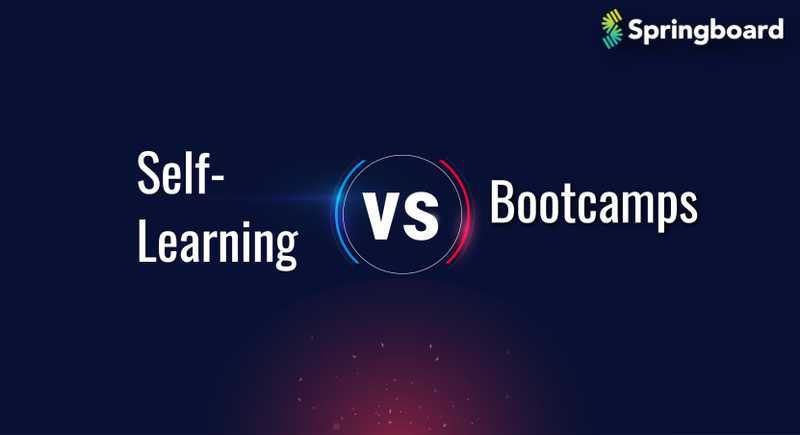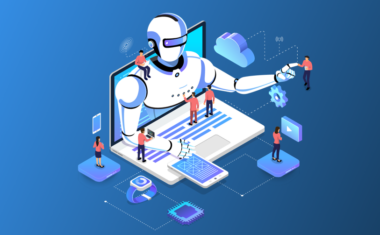Data science is a booming profession that continues to see high job growth, competitive salaries, and diverse opportunities across all industries. In 2020, data scientists topped LinkedIn’s Emerging Jobs Report for the third year in a row, with demand for data and machine learning specialists continuing to ramp up in 2021—the United States Bureau of Labor Statistics forecasts that the number of data science jobs will grow by another 28% by 2026.
The education industry has risen to meet this demand, with online bootcamps developing detailed curricula to prepare prospective students for the workforce; massive open online courses (MOOCs) spinning up programs that offer certifications; and troves of free online resources promising to teach prospective students everything they need to know—from Python and Pandas to linear algebra and statistics—through free videos and blog posts.
With so many free and paid resources available, the process of choosing between self-taught and mentor-guided courses can raise a lot of questions and become overwhelming. Are paid courses always better? Should you start with self-learning? Is it even possible to successfully train yourself to become a data scientist?
Data science is in high demand. People go to school to learn it. They get degrees in it. They leave their jobs to do it. But what is the best way to learn data science, self-learning or bootcamps? Find out in this guide.
The following guide offers answers to some of these burning questions.
Teaching Yourself Data Science: Everything You Need to Know

Before diving into how you can learn data science on your own, it’s important to be clear about what you should expect to learn. Data science skills are highly technical and include proficiency in programming languages like Python and SQL, the ability to wrangle datasets and perform data analysis, familiarity with machine learning algorithms and natural language processing, and understanding concepts such as decision trees, k-means, and linear regression. There are also crucial soft skills required of all successful data scientists such as strong communication and collaboration, an ability to identify business problems, and confidence in using data to tell a story.
When considering self-learning options, it’s worth determining whether a resource covers all of these bases; whether the course work results in a portfolio that will make you competitive in the job market; and whether there is sufficient guidance and troubleshooting should you get stuck. You know yourself better than anyone else—it’s important to honestly assess the types of support you will need in order to succeed.
Blog posts, YouTube videos, and other free resources

Pros: In addition to being free and easily accessible, resources like blog posts and YouTube videos can be good for introducing prospective students to important data science concepts, offering an overview of the profession and the skills required, and addressing highly specific topics, such as how linear regression can be used in machine learning, or exercises involving NumPy for data analysis. For people who already have backgrounds in computer science or the foundational skills required for data science, these free resources can be useful in supplementing existing knowledge.
Cons: As anyone who has tried to learn a language from videos or apps can attest, learning a programming language without the guidance of an instructor, without the ability to ask questions, and without having someone to correct and offer explanations for errors can be incredibly challenging. While not impossible, trying to get a grasp of the more technical aspects of data science through blog posts and YouTube videos can prove a frustrating experience for students, and without an industry expert offering feedback and advice on projects, it often isn’t the right path for newcomers who are serious about a career in data science.
Get To Know Other Data Science Students
Esme Gaisford
Senior Quantitative Data Analyst at Pandora
Leoman Momoh
Senior Data Engineer at Enterprise Products
Nick Lenczewski
Data Scientist at Ovative Group
MOOCs
Pros: Massive Open Online Courses, or MOOCs, have proliferated in recent years and include high profile options such as Coursera, Udemy, DataCamp, Khan Academy, Codecademy, EdX, and Simplilearn. Many of the courses are comprehensive and developed by college professors and industry experts, allow students to go at their own pace, and offer step-by-step lessons on programming languages. Some courses also offer certifications and can count toward college credits.
Cons: MOOCs present a similar challenge as blogs and YouTube videos—most courses lack interactivity with an instructor and don’t include mentorship or career guidance, which means if you get stuck during the learning process or want individualized feedback on a project, it can be hard to get the help you need. MOOCs also have an attrition and accountability problem—in a Coursera data science course run by Johns Hopkins University, 1.76 million people signed up but only 71,589 got far enough into the course to receive verified certifications, and 917 students completed all nine courses and signed up for the capstone course. Research has found that many people who start MOOCs often don’t finish them, and even those who do find it hard to be consistent with their studies.
Books
Pros: Books for learning data science are useful tools for intermediate programmers, those who are rusty and need to brush up on their data science concepts, or beginners who want a comprehensive overview of the profession and its required skills. Those who have at least a basic understanding of programming stand to benefit the most from data science books.
Cons: Teaching yourself data science through books presents a variety of challenges, especially if you’re a complete beginner. Learning a programming language through a book, without the guidance of an instructor, and without the ability to ask questions, can be challenging; the solitary nature of book learning means fewer to no opportunities for collaboration; and most book-based education doesn’t involve portfolio-worthy data science projects, mentorship, or opportunities to get feedback on your work.
Why a Data Science Course or Bootcamp May Be Better Than Self-Learning

When choosing between bootcamps and instructor-supported online courses, it’s important to determine your end goal. Are data science bootcamps a stepping stone to an even more complex machine learning course? Is it the key to a career change? Are you hoping to land a job as a data scientist once you graduate?
The answers to these questions are important because they can help you create a checklist for the type of bootcamp best suited to you. For example, if your goal is to land a job on graduation, then you’ll want to enroll in a data science bootcamp that offers career guidance, prioritizes portfolio development, includes a capstone project, and gives you easy access to industry mentorship. Likewise, if you have ambitions to work in machine learning engineering, or to simply prepare yourself for more advanced data science jobs, you’ll want a course that introduces you to concepts such as deep learning, natural language processing, and recommendation systems.
The strongest bootcamps that have a high success rate when it comes to graduation and job placements typically include the following components:
- Comprehensive curriculum. Whether a student is a complete beginner or someone with a foundational knowledge of the subject matter, the best bootcamps are comprehensive and use a variety of resources ranging from videos to articles, hands-on projects, and career-related coursework to ensure that students learn the skills that employers are looking for. These courses are also clear about any pre-requisite skills required and offer prep courses for those who need additional training to get up to speed on programming languages and statistics.
- Real-world projects. Any data science bootcamp worth its salt will help students prepare a strong portfolio that includes a variety of projects showcasing what the student is capable of. When choosing between courses, consider whether a bootcamp requires a capstone project and whether there are opportunities to gain real-world experience by wrangling complex data sets.
- Accessible mentors. It’s well established that having access to an industry mentor can mean the difference between career advancement and stagnation. Mentors can offer valuable industry insights, give guidance and actionable advice on projects and career decisions, and help hold students accountable. The more personalized the mentorship, the better.
- Career coaching and networking. It’s one thing to be a highly skilled data scientist. It’s another to navigate the job market and get potential hiring managers to notice you. Look for bootcamps that incorporate career coaching and networking so that all your hard-earned data science skills will find their way to recruiters and, ultimately, land you the job that you want.
- Job guarantee. Few bootcamps go so far as to offer graduates a job guarantee (i.e. a guarantee that you will find a job within the discipline after you complete the course, or you get your money back). But if you find one that does, it usually means they have confidence in their bootcamp and a solid track record of graduating workforce-ready students who go on to land jobs as data scientists.
Since you’re here…Are you interested in this career track? Investigate with our free guide to what a data professional actually does. When you’re ready to build a CV that will make hiring managers melt, join our Data Science Bootcamp which will help you land a job or your tuition back!






